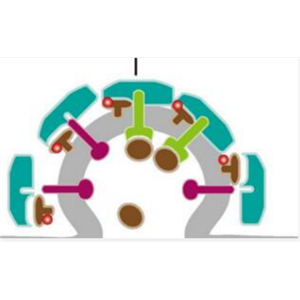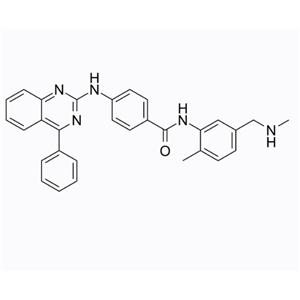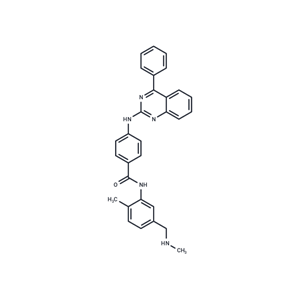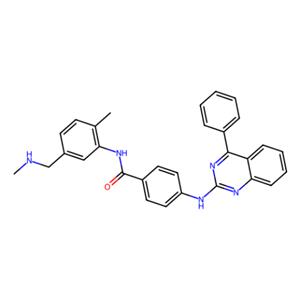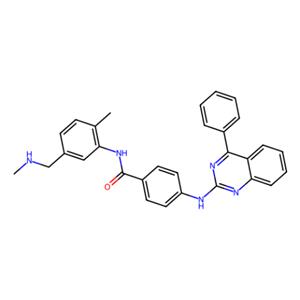产品属性:
产品名称 | 规格 | CAS号 | 型号 |
BMS-833923 | 5mg 10mg 50mg | 1059734-66-5 | EY-Y0165444 |
Cas No.1059734-66-5
别名 BMS 833923;BMS833923;XL-139;XL139;XL 139
化学名 N-[2-methyl-5-(methylaminomethyl)phenyl]-4-[(4-phenylquinazolin-2-yl)amino]benzamide
分子式 C30H27N5O

分子量 473.57
溶解度 ≥ 47.4 mg/mL in DMSO, ≥ 5.14 mg/mL in EtOH with ultrasonic and warming
储存条件 Store at -20°C
General tips For obtaining a higher solubility , please warm the tube at 37 ℃ and shake it in the ultrasonic bath for a while.
Shipping Condition Evaluation sample solution : ship with blue ice
All other available size: ship with RT , or blue ice upon request
产品描述:
The Hedgehog (Hh) signaling is a critical pathway involved in embryonic development and in tissue maintenance and repair in adults. It consists of the Hh ligands, the transmembrane receptors Patched 1 and 2, the G-protein- coupled receptor-like protein SMO and the glioma-associated oncogene transcription factors GLI1 to 3. The aberrant activation of Hh pathway, both mutational and epigenetic, is found to be associated with multiple aspects of tumorigenesis in various tumor cells. As a smoothened inhibitor, BMS-833923 can block the binding of cyclopamine (a naturally occurring SMO inhibitor) to SMO. It showed potent Hh pathway inhibitory activity with IC50 values at nanomolar in multiple cell-based assays. BMS-833923 also potently inhibited Hh pathway in medulloblastoma and pancreatic carcinoma xenograft models [1, 2 and 3].
In vitro, BMS-833923 inhibited the expression of GLI1 and PTCH1 in cell lines expressing wild-type SMO or activated mutant SMO with IC50 values in the range from 6 to 35 nM. In the FACS-based binding assays, it does-dependently suppressed cyclopamine binding to SMO with IC50 value of 21 nM. In the esophageal adenocarcinoma cell lines OE19 and OE33, treatment of BMS-833923 significantly reduced cell proliferation with IC50 values of both 10 μM. Besides that, BMS-833923 was found to inhibit the growth of multiple myeloma cells and the proportion of ALDH+ cancer stem cells. It also inhibited the growth of many other tumor cells derived from patients with hematological malignancies including ALL, AML and CML [3 and 4].
In animal models with medulloblastoma and pancreatic carcinoma xenografts, administration of BMS-833923 at single oral dose showed robust inhibition of Hh pathway. In a rat model with gastroesophageal reflux disease, the administration of BMS-833923 at dose of 10 mg/kg/day resulted in the decreased development of both Barrett esophagus and esophageal adenocarcinoma by 35.7% [3 and 5].
References:
[1] Siu L L, Papadopoulos K P, Alberts S, et al. A first-in-human phase 1study of an oral hedgehog pathway antagonist, BMS-833923 (XL139), in subjects with advanced or metastatic solid tumors. Mol Cancer Ther, 2009, 8(12 Suppl): A55.
[2] Justilien V, Fields A P. Molecular Pathways: Novel Approaches for Improved Therapeutic Targeting of Hedgehog Signaling in Cancer Stem Cells. Clinical Cancer Research, 2015, 21(3): 505-513.
[3] Gendreau S B, Hawkins D, Ho C P, et al. Abstract B192: Preclinical characterization of BMS‐833923 (XL139), a hedgehog (HH) pathway inhibitor in early clinical development. Molecular Cancer Therapeutics, 2009, 8(12 Supplement): B192-B192.
[4] Zaidi A H, Komatsu Y, Kelly L A, et al. Smoothened inhibition leads to decreased proliferation and induces apoptosis in esophageal adenocarcinoma cells. Cancer investigation, 2013, 31(7): 480-489.
[5] Gibson M K, Zaidi A H, Davison J M, et al. Prevention of Barrett esophagus and esophageal adenocarcinoma by smoothened inhibitor in a rat model of gastroesophageal reflux disease. Annals of surgery, 2013, 258(1): 82-88.
